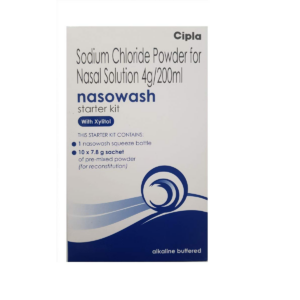SODIUM CHLORIDE + NASAL DECONGESTANTS
Sodium Chloride: Drug: Sodium Chloride
Use: Sodium chloride is used as a mineral supplement to treat or prevent sodium deficiency in the body. It is commonly used to replenish salt levels in the body during periods of dehydration or excessive sweating, such as during intense physical activity or in hot climates. It is also used as a diluent or solute in various medications, including intravenous (IV) fluids.
Mechanism of Action: Sodium chloride works by maintaining proper electrolyte balance in the body. It is an essential component of body fluids and helps regulate multiple bodily functions, including nerve and muscle function, maintaining blood pressure, and balancing fluid levels.
Dose: The dose of sodium chloride varies depending on the specific use and the patient’s age and medical condition. As a mineral supplement, the typical adult dose is 1-3 grams per day, which can be taken orally or administered intravenously. The exact dosage should be determined by a healthcare professional.
Side Effects: Sodium chloride is generally safe when used as recommended, but it may cause side effects in some individuals. Common side effects include:
1. Excessive thirst
2. Swelling or fluid retention
3. High blood pressure
4. Difficulty breathing
5. Irregular heartbeat
6. Nausea and vomiting
7. Headache and dizziness
It is important to note that excessive sodium chloride intake can lead to electrolyte imbalance and increase the risk of high blood pressure, which can be especially harmful for individuals with certain medical conditions, such as heart or kidney problems. Therefore, it is crucial to follow the recommended dosage and consult a healthcare professional before starting sodium chloride supplementation.
Nasal Decongestants: Nasal decongestants are medications used to relieve congestion and stuffiness in the nasal passages. They work by narrowing blood vessels in the nasal membranes, reducing swelling and congestion. This allows for easier breathing and provides temporary relief from symptoms associated with allergies, colds, and sinusitis.
The most common nasal decongestant is pseudoephedrine, available in both oral and nasal spray forms. Pseudoephedrine works by stimulating alpha-adrenergic receptors, causing vasoconstriction in the nasal blood vessels. This reduces inflammation and congestion in the nasal passages.
The recommended dose of pseudoephedrine depends on the formulation and strength. Typically, for adults, the oral dose is 30-60mg every 4-6 hours, not exceeding 240mg in 24 hours. For nasal spray, 2-3 sprays in each nostril every 10-12 hours is usually recommended. However, it is important to follow the specific instructions provided by the healthcare professional or stated on the product packaging.
Side effects of nasal decongestants may include increased heart rate, elevated blood pressure, nervousness, restlessness, dizziness, headache, insomnia, and dry mouth. Pseudoephedrine can also cause urinary retention in some individuals. It is important to note that pseudoephedrine can be misused or abused, as it can be used to produce methamphetamine. Therefore, it is often sold behind the counter and may require identification or a prescription to purchase.
It is essential to use nasal decongestants for short periods, generally no longer than 3-5 days. Overuse or prolonged use can lead to a condition known as rhinitis medicamentosa, where the nasal passages become dependent on the decongestant, leading to worsening congestion when the medication is stopped.
As with any medication, it is crucial to consult with a healthcare professional for proper usage instructions and to determine if nasal decongestants are appropriate for individual circumstances, especially for those with pre-existing medical conditions or other medications being taken.

